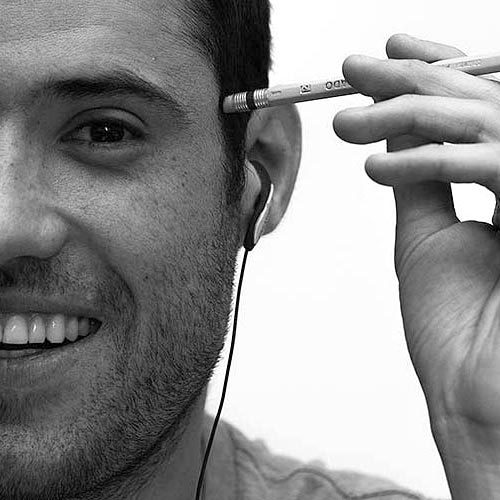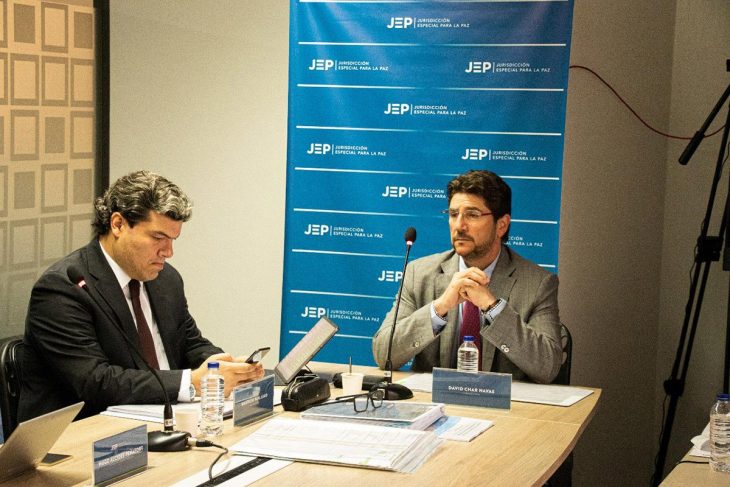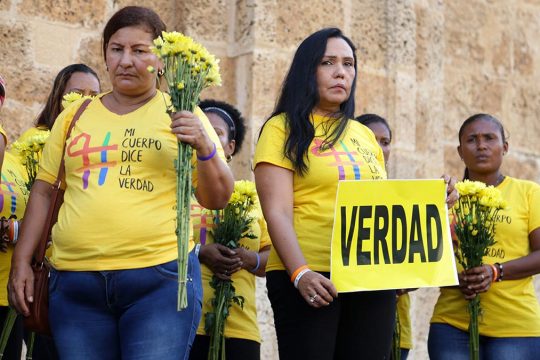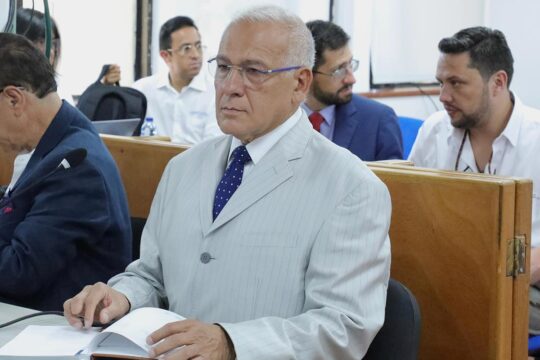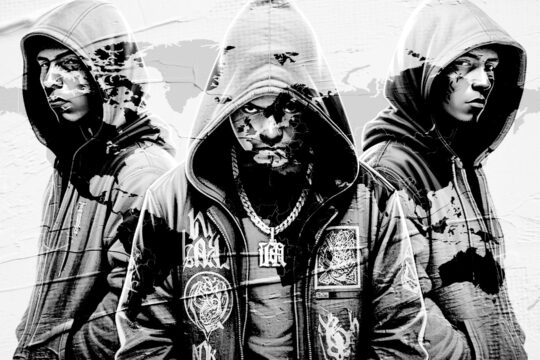In theory, right-wing paramilitaries are excluded from the transitional justice system stemming from the peace deal signed by the Colombian government and the former Revolutionary Armed Forces of Colombia (FARC) in 2016, because they were already subjected to another transitional justice mechanism a decade ago. But reality is fuzzier and, as two headline-grabbing cases in mid-May have shown, the special tribunal – or JEP, as it is locally known – still has to solve the dilemma of what to do with dozens of politicians and other civilians who aided the paramilitaries and have not faced justice.
Two contested decisions
In May, after the Inspector General’s Office lodged an appeal, JEP justices had to reconsider their acceptance of a powerful former senator who claimed the country’s second-highest vote tally in the 2014 legislative elections and was later arrested on corruption charges. Musa Besaile confessed to paying a prosecutor a 500,000-dollar bribe in a bid to stall a criminal inquiry against him over negotiating political support from the paramilitaries two decades ago. In January, the special tribunal decided to accept him – as a non-military state actor who promised to acknowledge his role in serious crimes and who already admitted meeting with powerful paramilitary boss Salvatore Mancuso between 2002 and 2003.
Colombia’s main institution in charge of government oversight objected to this decision, arguing that the corruption scheme by which Besaile funded his bribe – which involved fake haemophilia patients – had no relation to the armed conflict and was planned years before it was doled out. In the end, the JEP decided to accept him over his links to the paramilitaries but exclude the bribery inquiry, which will be tried in the ordinary criminal justice system.
One day later, another contentious case came to light. The Supreme Court objected a JEP decision, setting up the first major clash of jurisdictions for the transitional justice system so far. The high court, which over the past decade convicted 60 former national lawmakers over political alliances with the paramilitaries, protested against the JEP’s decision to accept one of the most notorious politicians involved in that same major scandal known by Colombians as ‘parapolitics’: Salvador Arana, a former state governor and diplomat, under investigation for diverting public funds to the paramilitaries. He had already been handed down two convictions, including a 40-year sentence for ordering the murder of a local mayor who had publicly accused him of being in cahoots with the paramilitaries.
In a heavily-worded statement, the Supreme Court argued that Arana should not be considered as a state actor, but rather an active combatant - a “pure paramilitary” in its words – and that it should retain jurisdiction over his case. The JEP contends that Arana’s crimes were committed while he was a public official and that the transitional justice supersedes other jurisdictions regarding crimes linked to the armed conflict. Their clash must now be resolved by the Constitutional Court, the country’s top court.
In the end, the dilemma exists because Colombia has set up several transitional justice mechanisms in the past, but with porous and overlapping borders.
What to do with the paramilitaries?
Both cases show the complexity of decisions regarding the paramilitary, originally born to counter left-wing guerrillas in the 1980s and eventually responsible for thousands of homicides and massacres. In the end, the dilemma exists because Colombia has set up several transitional justice mechanisms in the past, but with porous and overlapping borders.
More than 35.000 members of Colombia’s right-wing paramilitary groups demobilised between 2003 and 2007, under former President Álvaro Uribe’s administration. At the time, the Colombian Congress objected to the government’s original bill that in practice granted them blanket pardons, significantly upgrading it and recognising victims’ rights to truth, justice, redress and non-recurrence for the first time. The result was a transitional justice special court, dubbed Justice and Peace, which convicted 195 former paramilitaries over a decade. Its hearings allowed the exhumation of the remains of more than 7.500 of their victims and helped researchers shed light on hundreds of human rights violations.
One major grey area persisted though. This transitional justice mechanism prosecuted active combatants of the former United Self-Defence Forces of Colombia (AUC) and other paramilitary groups, who were responsible for over 18.000 murders, according to the National Centre for Historical Memory. But, given that entry conditions were restricted to those who had been in arms and then demobilised, it fell short of identifying or prosecuting other persons who aided or abetted them.
A few years later, the Supreme Court began filling in those gaps, opening criminal inquiries into politicians who – like Arana - benefitted from their armed support, eliminating political rivals or coercing citizens to vote for them. Most of their financiers and collaborators, however, remained unidentified, which is why the 2016 peace accord paved the way for members of the military and civilians who colluded with them to be prosecuted as either state agents or ‘third party actors’. The Constitutional Court overruled this in part, barring the JEP from actively seeking third parties, but allowing them to voluntarily seek admission.
Scores of civilian requests
The possibility of obtaining more lenient sanctions has meant that the JEP ended up facing a barrage of admission requests from dozens of former paramilitaries, politicians and public officials, many of whom are seeking better deals or a revision of their case. Some have done so while still insisting on their innocence and refusing to shed light on human rights violations, even though the JEP’s non-prison sanctions are conditional to defendants acknowledging their responsibility, telling the truth, and personally helping redress victims.
The tribunal has routinely denied former paramilitary bosses, although it did open the door for them to acknowledge other crimes committed either before or after they were active combatants. But civilians’ cases have proven more complex.
Many politicians investigated, but not yet convicted, for their dealings with the paramilitaries have sought acceptance into the JEP. So have a number of persons investigated for crimes with no evident link to the armed conflict, including high-profile names such as former minister Sabas Pretelt, convicted of bribing lawmakers to ensure a favourable vote that would have allowed former President Uribe to run for an unprecedented third period in 2010. Or former Cúcuta mayor Ramiro Suárez Corzo, who was convicted for the murder of the state comptroller and whose acceptance into the transitional justice was also questioned by the Inspector General’s Office.
In total, the JEP is assessing the admission of 175 civilian state agents and of 766 non-state agents who aided and abetted illegal armed groups. So far, 13 civilians have been admitted. Besides, the JEP is currently studying the legal situation of 9.787 former FARC rebels and 2.680 military and policemen involved in serious crimes such as extrajudicial executions.
A litmus test for civilians
Paving the way for non-armed actors to benefit from the peace accord meant that the special tribunal had to design a way to gauge their commitment to redress victims and tell the truth.
This need materialized when David Char, a little known former senator investigated for his links to the paramilitaries, was denied admission to the transitional justice and successfully appealed. Justices sitting on the appeals section not only reversed the original decision and accepted Char in April 2018, but also wrote an interpretative ruling laying down a procedure for all civilians. Since then, defendants must submit a proposed programme detailing specific contributions to redress, truth and non-recurrence, including a timeline and budget.
Char vowed to fund a 159,000-dollar agricultural project and local school benefitting victims, to detail crimes committed by the paramilitaries in his region and to never run for office again. He has proven a compliant defendant so far, giving lengthy statements to the JEP and participating in spaces with victims. The Truth Commission also certified that his extrajudicial contributions had been deemed valuable and were corroborated by other witnesses. Another former lawmaker, Álvaro Ashton, has offered 60,000 dollars in scholarships for victims and psychological support programmes in two towns.
Not only the JEP has had to grapple with the question of how much it should continue probing the role of paramilitaries in Colombia’s history of violence. As Justice Info told, under current President Iván Duque, the National Centre for Historical Memory decided to stop funding investigations on violations committed by them, a decision that sparked outrage among many academics and universities.
Colombia’s attempts to close its armed conflict by chapters mean its current transitional justice system will continue facing contentious questions into which defendants that aided and abetted paramilitary groups it decides to admit, while at the same time it advances in its core mission of prosecuting former FARC rebels and military who committed serious crimes. In practice, the question is whether the JEP can succeed in uncovering the roles played not only by direct perpetrators, but also by civilians in the concentric rings around them.

